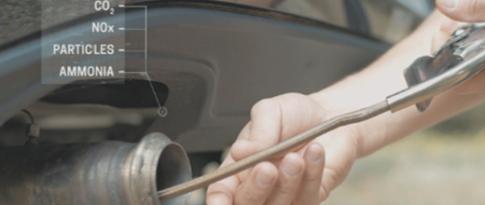13.10.2023
3 minutes of reading

Since air pollution remains a major public health issue, IFPEN is developing innovative tools to help in the drive towards less polluting individual and collective practices. Below we focus on the solutions offered by IFPEN via its Ressources Energétiques and Transports Energie Carnot Institutes.
Air pollution: a few facts
Particles and gases, such as nitrogen oxide (NOx), sulfur dioxide (SO2), ozone (O3), ammonia (NH3) and heavy metals are all air pollutants. Some are the result of natural phenomena but many are produced by human activities including, in particular, transport, industry, agriculture and heating.
Air pollution and health
Air pollution has numerous effects on health: in the long term, it can cause or exacerbate respiratory, cardiovascular and neurological diseases. Pollution is also associated with fertility problems and has an impact on child development.
In France:
40,000 deaths attributable to fine particles
7% of total mortality among the French population
Globally:
According to the WHO, 7 million premature deaths worldwide each year are linked to poor air quality.
What solutions to reduce pollutant emissions?
In spite of the efforts made by France and Europe in the last 30 years, some regions still exceed permitted pollutant thresholds. This reality calls for a redoubling of efforts, both at individual level and in the most polluting sectors.
One of the main solutions to be adopted is environmental monitoring, since this allows us to measure air quality and adapt behavior accordingly in order to reduce emissions. IFPEN devotes significant research resources to this area and has developed a variety of technological solutions to qualify emissions in the fields of mobility and industry.
Flair Suite, connected tools supporting environmental and industrial gas monitoring
In order to monitor the chemical evolution of the atmosphere or gases emitted from industrial sites into either the atmosphere or the soil, IFPEN’s teams based in the Ressources Energétiques Carnot Institute developed Flair Suite, a dedicated set of technological solutions.
Flair car™, Flair box™, Flair soil™, Flair lab™ and Flair map™ are the various solutions making up Flair Suite, aimed at identifying, quantifying and mapping greenhouse gases and other gas pollutants in real time. The suite addresses the various potential environmental, economic and safety issues in urban areas, on industrial sites and around natural sources.
>> Click here to find out more about Flair Suite
Connected tools to support more environmentally-friendly mobility
Road transport is a major contributor to the degradation of air quality. For example, it is the origin of :
- 49% of nitrogen oxide emissions in France in 2020
- 13% of emissions of the smallest fine particles.
To address the challenges of the ecological transition in the field of individual mobility and goods transport, public and industrial players and citizens need to be supported as they make decisions concerning the most appropriate technologies for these new demands. Such is the case, for example, for the introduction of low emission zones (LEZ) in France to address air quality problems in major cities (> 150,000 inhabitants).
The IFPEN Transports Energie Carnot Institute addresses these needs by conducting impact studies combining different types of data and simulations as well as life-cycle analyses. These studies are often combined with web services to make them more scalable and accessible to as many people as possible. It also proposes cross-functional services to regional and government players for the evolution of mobility and supports start-ups with technological services based on data science.
IFPEN has also developed an innovative, real-time air-quality monitoring system, capable of precisely measuring road traffic pollutant levels (exhaust gases and non-exhaust emissions).
In addition, using simulation tools and from data relating to projected vehicle fleets, it constructs prospective scenarios aimed at big cities.
Zoom sur…
“Verdir ma flotte” (“Green my fleet”), developed by the Transports Energie Carnot Institute and its partners, is an online tool that helps logistics sector players seeking to decarbonize their vehicle fleets to quantify the economic and ecological impact of alternative fuels (B100 biodiesel, HVO and gas), and hybrid and electric technologies.
Geco air, an application for all for cleaner driving
Drawing on its expertise in the field of pollutant and powertrain modeling, IFPEN developed Geco air, an application that calculates pollutant (NOx, CO, PM) and CO2 emissions for each journey in the form of a “mobility score”.
It thereby determines the ideal driving style to be adopted and provides users with personalized advice aimed at steering them towards more responsible mobility.
>>Click here to find out more about Geco air
Real-e, a tool to meet fleet monitoring requirements
Another solution developed by IFPEN is Real-e, an innovative connected tool that measures a vehicle’s exhaust emissions (CO, CO2, NOx, PM, NH3) in real driving conditions. Real-e provides a rapid, exhaustive and reliable evaluation of real emissions.
Real-e therefore makes it easier to monitor fleets by identifying the most polluting vehicles, in order to ensure compliance with existing regulations.
>> Click here to find out more about Real-e (Real emissions)
You may also be interested in
Road transport emissions: integrated research for air quality!
According to the WHO, 7 million premature deaths worldwide each year are linked to poor air quality, a problem to which road transport makes a significant contribution. Thanks to regulatory and technological developments, as well as the renewal of the vehicle fleet, emissions from this sector have certainly been falling in recent years. However, it remains a major contributor to the deterioration of air quality...
Road transport emissions: integrated research for air quality!
According to the WHO, 7 million premature deaths worldwide each year are linked to poor air quality, a problem to which road transport makes a significant contribution. Thanks to regulatory and technological developments, as well as the renewal of the vehicle fleet, emissions from this sector have certainly been falling in recent years. However, it remains a major contributor to the deterioration of air quality...






